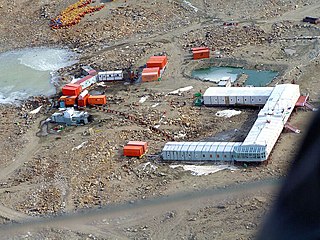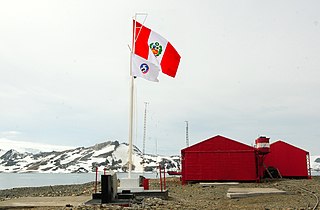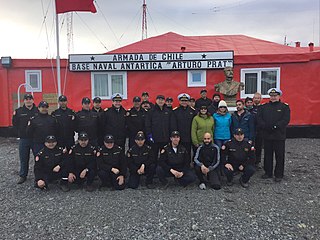A national Antarctic program is any government operated or supported program which is mandated with managing the support of scientific research and contributing to the governance and protection of the Antarctic environment on behalf of its nation and in the spirit of the Antarctic Treaty. [1] The Antarctic Treaty, the international agreement that regulates Antarctic activity, has been signed by 54 countries. Of those, 38 have national Antarctic programs. 33 of these programs have a permanent presence in Antarctica and are members of Council of Managers of National Antarctic Programs (COMNAP). Four countries have no permanent presence in Antarctica, but have programs that are observers to COMNAP. [2] Only one country, Pakistan, maintains a national Antarctic program with no affiliation to COMNAP. [3]

Scott Base is a New Zealand Antarctic research station at Pram Point on Ross Island near Mount Erebus in New Zealand's Ross Dependency territorial claim. It was named in honour of Captain Robert Falcon Scott, RN, leader of two British expeditions to the Ross Sea area of Antarctica. The base was set up as support to field research and the centre for research into earth sciences, and now conducts research in many fields, operated by Antarctica New Zealand.

The Indian Antarctic Programme is a multi-disciplinary, multi-institutional programme under the control of the National Centre for Polar and Ocean Research, Ministry of Earth Sciences, Government of India. It was initiated in 1981 with the first Indian expedition to Antarctica. The programme gained global acceptance with India's signing of the Antarctic Treaty and subsequent construction of the Dakshin Gangotri Antarctic research base in 1983, superseded by the Maitri base from 1989. The newest base commissioned in 2012 is Bharati, constructed out of 134 shipping containers. Under the programme, atmospheric, biological, earth, chemical, and medical sciences are studied by India, which has carried out 40 scientific expeditions to the Antarctic.

Showa Station, sometimes alternately spelled Syowa Station, is a Japanese permanent research station on East Ongul Island in Queen Maud Land, Antarctica. Built in 1957, Showa Station is named for the era in the Japanese calendar during which it was established, the Shōwa period.

Base General Bernardo O'Higgins Riquelme, also Base Libertador General Bernardo O'Higgins Riquelme, or shortly Bernardo O'Higgins, named after Bernardo O'Higgins, is a permanently staffed Chilean research station in Antarctica and the capital of Antártica Commune. It lies at an elevation of 13 m, about 30 km south-west of Prime Head, the northernmost point of the Antarctic Peninsula, at Cape Legoupil.

Henryk Arctowski Polish Antarctic Station is a Polish research station on King George Island, off the coast of Antarctica.

Multiple governments have set up permanent research stations in Antarctica and these bases are widely distributed. Unlike the drifting ice stations set up in the Arctic, the current research stations of the Antarctic are constructed either on rocks or on ice that are fixed in place.

The Mirny Station is a Russian first Antarctic science station located in Queen Mary Land, Antarctica, on the Antarctic coast of the Davis Sea.

Bellingshausen Station is a Russian Antarctic station at Collins Harbour, on King George Island of the South Shetland Islands. It was one of the first research stations founded by the Soviet Antarctic Expedition in 1968. It is also the location of Trinity Church, the only permanently staffed Eastern Orthodox church in Antarctica.

The Law-Racoviță-Negoiță Station, known only as the Law-Racoviță Station until 2011, is the first Romanian station for research and exploration in Antarctica, named after the Romanian explorer Emil Racoviță and inaugurated on January 13, 2006 at the location of a station constructed in 1986 by Australia and donated to Romania. The station may be found in Princess Elizabeth Land, in the Larsemann Hills, 2 kilometres (1.2 mi) away from China's Antarctic Zhongshan Station.

González Videla Base is an inactive research station on the Antarctic mainland at Waterboat Point in Paradise Bay. It is named after Chilean President Gabriel González Videla, who in the 1940s became the first chief of state of any nation to visit Antarctica. The station was active from 1951–58, and was reopened briefly in the early 1980s. Occasional summer visits are made by Chilean parties and tourists.

The Machu Picchu Scientific Base is a Peruvian polar scientific research facility in Antarctica, established to conduct Antarctic research on geology, climatology and biology. More specifically, its purpose is to study the continent's geological past, potential sea resources, wind strengths, air pollution, and the animal adaptation in a freezing environment. The base is named after the World Heritage Site Machu Picchu.

The General Artigas Station, also referred to as the Artigas Base is the larger of the two Uruguayan scientific research stations in Antarctica, the other one being Elichiribehety Base. It is one of the 68 bases in Antarctica.

The Uruguayan Antarctic Institute is Uruguay's governmental agency to fund, organize, control and promote research on Antarctica according with the Antarctic Treaty System. It was founded by scientists, and is now managed by Uruguay's Ministries of Defense, Foreign Affairs and Education.

The Great Wall Station is the first Chinese research station in Antarctica and opened on 20 February 1985. It lies on the Fildes Peninsula on King George Island, 960 kilometres (600 mi) from Cape Horn. It is sited on ice-free rock, about 10 metres (33 ft) above sea level.

Captain Arturo Prat Base is a Chilean Antarctic research station located at Iquique Cove, Greenwich Island in the South Shetland Islands, Antarctica.
Bulgarian Antarctic Institute is the national Antarctic operator of Bulgaria, organizing annual Antarctic campaigns and maintaining the Bulgarian Antarctic base of St. Kliment Ohridski on Livingston Island in the South Shetland Islands.
Many research stations in Antarctica support satellite field camps which are, in general, seasonal camps. The type of field camp can vary – some are permanent structures used during the annual Antarctic summer, whereas others are little more than tents used to support short term activities. Field camps are used for many things, from logistics to dedicated scientific research.
Council of Managers of National Antarctic Programs (COMNAP) is an international association that develops and promotes best practice in managing the support of scientific research in Antarctica. Members are composed of national research programs who respective governments are signatories to the Antarctic Treaty committing the continent as a natural reserve.

Michelle Rogan-Finnemore is a New Zealand-American science administrator, and currently the Executive Secretary of the Council of Managers of National Antarctic Programmes (COMNAP) which is the international association which brings together the National Antarctic Programs that make up its members. She is also the namesake of Finnemore Peak.

Gillian Shirley Wratt is a New Zealand botanist and science administrator. She was the first woman director of the New Zealand Antarctic Programme (1992–1996) and made a Member of the New Zealand Order of Merit for services to Antarctica.